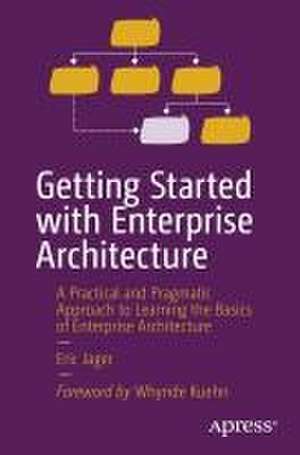Getting Started with Enterprise Architecture: A Practical and Pragmatic Approach to Learning the Basics of Enterprise Architecture
Autor Eric Jageren Limba Engleză Paperback – 2 dec 2023
The book's pragmatic approach keeps existing architecture frameworks and methodologies in mind while providing instructions that are readable and applicable to all. The Enterprise Architecture Implementation Wheel builds on the methodology of existing architecture frameworks and allows you to apply the theory more pragmatically and closer to the reality that an architect encounters in daily practice.
While the main focus of the book is the actual steps taken to design an enterprise architecture, other important topics include architecture origin, definition, domains, visualization, and roles. Getting Started with Enterprise Architecture is the ideal handbook for the architect who is asked to implement anEnterprise Architecture in an existing organization.
What You'll Learn
- Implement measurable goals and objectives for a baseline architecture
- Create meaningful catalogues, diagrams, and maps to communicate the architecture to an organization
- Measure the progress of implementing the architecture
- Identify a company’s needs and develop an appropriate strategy to satisfy those needs
Enterprise architects, project managers and executives.
Preț: 252.91 lei
Nou
Puncte Express: 379
Preț estimativ în valută:
48.39€ • 50.53$ • 40.05£
48.39€ • 50.53$ • 40.05£
Carte disponibilă
Livrare economică 14-28 martie
Livrare express 27 februarie-05 martie pentru 100.69 lei
Preluare comenzi: 021 569.72.76
Specificații
ISBN-13: 9781484298572
ISBN-10: 1484298578
Pagini: 275
Ilustrații: XV, 275 p. 102 illus.
Dimensiuni: 155 x 235 x 19 mm
Greutate: 0.41 kg
Ediția:1st ed.
Editura: Apress
Colecția Apress
Locul publicării:Berkeley, CA, United States
ISBN-10: 1484298578
Pagini: 275
Ilustrații: XV, 275 p. 102 illus.
Dimensiuni: 155 x 235 x 19 mm
Greutate: 0.41 kg
Ediția:1st ed.
Editura: Apress
Colecția Apress
Locul publicării:Berkeley, CA, United States
Cuprins
Chapter 1 Introduction.- Chapter 2 Architecture origin.- Chapter 3 Architecture definition.- Chapter 4 Architecture domains.- Chapter 5 Architecture roles.- Chapter 6 Architecture visualization.- Chapter 7 Architecture positioning.- Chapter 8 Architecture implementation.- Chapter 9 Next steps.- Chapter 10 Architecture application.- Chapter 11 Closing Remarks.- Appendix A - Example Information Map.- Appendix B - Example Maturity Model.- Appendix C - Example Work Package View.
Notă biografică
Eric Jager is a Certified Master Architect in the field of Enterprise Architecture. He is also a certified TOGAF® Enterprise Architecture Practitioner, Certified Business Architect® and ArchiMate® Practitioner. He is familiar with various architecture methodologies including, for example, the TOGAF Standard and the Zachman Framework.
Textul de pe ultima copertă
Implement a basic enterprise architecture from start to finish using a four stage wheel-based approach. Aided by real-world examples, this book shows what elements are needed for the initial implementation of a fundamental enterprise architecture
The book's pragmatic approach keeps existing architecture frameworks and methodologies in mind while providing instructions that are readable and applicable to all. The Enterprise Architecture Implementation Wheel builds on the methodology of existing architecture frameworks and allows you to apply the theory more pragmatically and closer to the reality that an architect encounters in daily practice.
While the main focus of the book is the actual steps taken to design an enterprise architecture, other important topics include architecture origin, definition, domains, visualization, and roles. Getting Started with Enterprise Architecture is the ideal handbook for the architect who is asked to implement an Enterprise Architecture in an existing organization. You will:
The book's pragmatic approach keeps existing architecture frameworks and methodologies in mind while providing instructions that are readable and applicable to all. The Enterprise Architecture Implementation Wheel builds on the methodology of existing architecture frameworks and allows you to apply the theory more pragmatically and closer to the reality that an architect encounters in daily practice.
While the main focus of the book is the actual steps taken to design an enterprise architecture, other important topics include architecture origin, definition, domains, visualization, and roles. Getting Started with Enterprise Architecture is the ideal handbook for the architect who is asked to implement an Enterprise Architecture in an existing organization. You will:
- Implement measurable goals and objectives for a baseline architecture
- Create meaningful catalogues, diagrams, and maps to communicate the architecture to an organization
- Measure the progress of implementing the architecture
- Identify a company’s needs and develop an appropriate strategy to satisfy those needs
Caracteristici
Provides readers with instructions on how to do, what the existing frameworks describe and what needs to be done Review architecture origin, definition, domains, and roles Bring the theory closer to the reality that an architect encounters in daily practice
